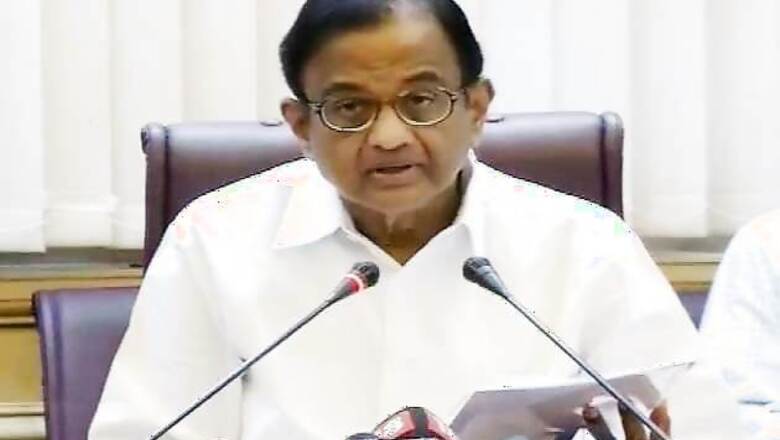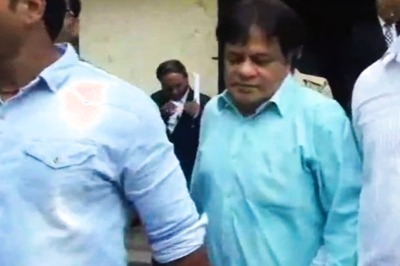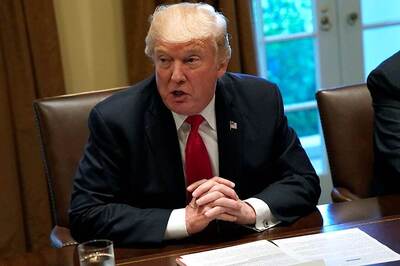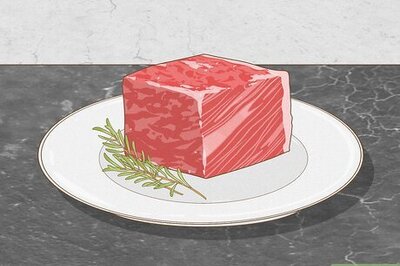
views
New Delhi/Mumbai: The government vowed on Monday to rein in the country's hefty fiscal deficit, increasing the pressure on the RBI on the eve of its next policy meeting to cut interest rates for the first time since April.
Finance Minister P Chidambaram pledged to nearly halve its fiscal deficit by March 2017 in a bid to avoid a credit rating downgrade and persuade the central bank to lower rates, but offered few concrete steps.
The Reserve Bank of India, which has kept interest rates on hold as it worries about persistent inflation and the country's fiscal deficit, said on Monday that recent reforms by New Delhi mark a step in the right direction, but more was needed.
Still, the RBI's language was less hawkish than in the recent past, as it said inflation pressure was likely to moderate starting in the January-March quarter, a sign it may soon be ready to ease rates.
"As macro-risks from inflation and twin deficits recede further, that could yield space down the line for monetary policy to respond more effectively to growth concerns," the Reserve Bank of India wrote in its review of macroeconomic and monetary developments for the July-September quarter.
The twin deficits refer to India's fiscal and current account deficits.
At a press conference on Monday that was unusual for the haste at which it was called and the timing - one day ahead of the RBI's policy review - Chidamabaram unveiled a fiscal consolidation plan that did not say how New Delhi aimed to rein in a ballooning subsidy bill.
Higher spending on fuel, food and fertilizer subsidies along with sluggish tax revenues has led many economists to forecast a fiscal deficit this current fiscal year of about 6 per cent of GDP. Chidambaram said India's fiscal deficit would come in at 5.3 per cent, up from New Delhi's earlier target of 5.1 per cent.
"We do not have an option," Chidambaram said, promising to reduce the deficit to 3 per cent of GDP by March 2017. The deficit last year was 5.8 per cent.
While most economists in a Reuters poll on October 19 said they did not expect the RBI to cut its policy repo rate on Tuesday, nearly half forecast that it would cut the cash reserve ratio, or the share of deposits banks must maintain as reserves with the central bank.
That was before Monday's press conference by Chidambaram, who pointedly said that he hoped the central bank would take note of the government's efforts to trim the deficit.
"We have upped the probability of a rate cut tomorrow, largely based on the hurried press conference in the morning. That could be construed as a cue for the RBI," said Abheek Barua, chief economist at HDFC Bank.
While the RBI is not statutorily independent, it has tended to enjoy a high degree of autonomy, and Subbarao has resisted pressure in the past from New Delhi to ease policy.
Show me more
New Delhi has unveiled a slate of reform measures since Chidambaram was installed as finance minister nearly three months ago as the government seeks to revive growth that had stalled dramatically under his predecessor, Pranab Mukherjee.
Those moves include raising the price of subsidised diesel and easing foreign direct investment in several industries, including supermarkets and airlines, all of which has won guarded praise from the RBI.
"The announcement of these reform measures in themselves are not sufficient to ensure recovery as their impact would critically hinge on successful implementation," the RBI wrote on Monday.
The main policy rate of 8 per cent is among the highest among major economies, and the RBI has resisted pressure from government and industry to lower rates.
"A credible fiscal consolidation strategy is now on the anvil but needs to be backed by further measures," the RBI said.
Under Chidambaram's plan, the government will focus on economising existing expenditure, reducing waste, and increasing revenue from share sales in state-run companies.
Financial markets were disappointed by a lack of specifics.
"In our view, the measures announced will be insufficient to contain the fiscal deficit at 5.3 per cent of GDP in FY13 due to higher subsidies and lower tax revenues," wrote Nomura economists, adding that they did not expect a Tuesday rate cut.
"The timing of these announcements (one day ahead of the RBI policy meeting) also suggests growing political pressure on the RBI to cut rates tomorrow," Nomura said.
'Fiscal precipice'
A government panel said last month India was teetering on a "fiscal precipice," calling on the government to slash its subsidy bill to get the deficit under control.
But cutting subsidies could be politically perilous for the populist ruling Congress party ahead of state and national elections, and Chidambaram stressed that all programmes to help India's poor would be protected under the consolidation plan.
The International Monetary Fund this month slashed its economic growth forecast for India for 2012 to 4.9 per cent from 6.1 per cent previously. Rating agency Standard & Poor's said the country faces a one-in-three chance of a credit rating downgrade to junk over the next two years.
"The ball is now in the RBI's court," said Arvind Mayaram, India's economic affairs secretary, when asked whether he expected the RBI to follow the fiscal steps with a rate cut.




















Comments
0 comment